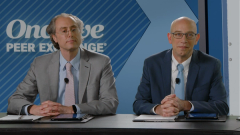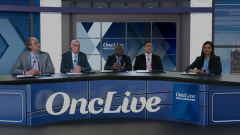
Progress in the Treatment and Management of SCLC
The panel discusses how the field of small cell lung cancer treatment has changed in recent years.
Episodes in this series

Charu Aggarwal, MD, MPH: Treatment of small cell lung cancer has changed significantly. I'm going to ask each one of you. What do you think is the most significant progress or change that we've made in the field? I'll start with you, Jared.
Jared Weiss, MD: There's one biggest change. I'm glad to go first. If we look back on the last decade, the biggest advance is the addition of PD-L1 inhibitory therapy being added to the standard platinum etoposide regimen. If you look at the evolution of front line therapy before that, it wasbased on toxicity, advantages and convenience advantages these matter. But PD-L1 is our first survival advantage in a long time.
Charu Aggarwal, MD, MPH: Charlie.
Charles Rudin, MD, PhD: I would entirely agree with that PD-L1 inhibitors unfortunately do not work in most patients. But when they do work, they can be transformative. That is, there are patients who have durable responses even in extensive stage disease. These can really change a person's fate. And that's something that was a long time coming and has clearly redefined our standard of care.
Charu Aggarwal, MD, MPH: Taofeek.
Taofeek Owonikoko, MD, PhD: I would agree with that. The other way to look at this in terms of what has changed is what is it that we were doing before that we stopped doing? If we all look at our practice pattern these days the use of anthracycline based chemotherapy probably now dropped off significantly, especially in the US [United States] and I would say maybe in Western Europe, except for some, maybe some die hard believers in anthracycline chemotherapy. Most of us do not use those agents. We all know how toxic regimen could be for a patient who is already frail. The other thing that has changed is, or that's potentially coming back is as people continue to use screening studies to find patient early. Now we know that patient with stage one disease. We are also now open to maybe offering them the surgical approach, which before none of us would even entertain. Those are some of the new re-evolution. To say of old strategies that we are now open to entertaining going forward.
Charu Aggarwal, MD, MPH: Vivek, you have the final word.
Vivek Subbiah, MD: I completely agree with Jared, Charlie, and Taofeek. The game changer has been the addition of immunotherapy to the frontline therapy. Jared said a decade, but I would disagree for the last 2 to 3 decades we didn't have any changes. Change with that addition of immunotherapy. That's a dramatic change, although that the, the overall survival difference is minimal. It's an incremental, benefit to patients and some patients towards the tail end of the curve who do benefit from immunotherapy benefit for a long, long period of time.
Charu Aggarwal, MD, MPH: I will just add that, yes. I agree that addition of PD-1 and PD-L1 inhibitors has been great, but I think for the first time we also have new second line therapies. We are moving away from using our old standards of recycling a taxane or trying to avoid Topotecan as best as we can, as much as we can. And we have drugs like Lurbinectedin, and there's a lot of excitement about bringing in maybe small molecules. And this is the kind of excitement we haven't seen in small cell in a while. At ASCO [American Society of Clinical Oncology] and other annual meetings, we are seeing that the small cell sessions keep getting bigger and bigger. This is all going in the right direction.
Transcript edited for clarity.










































